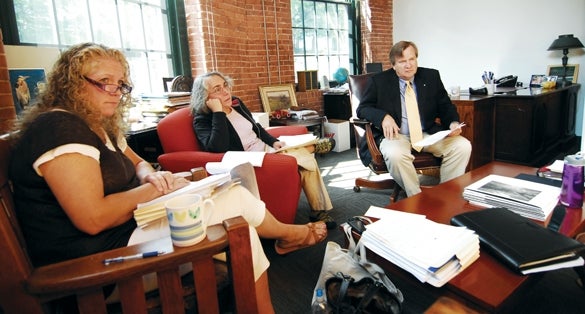Thanks to a new statewide system for delivering mental health services implemented within the last few months, the landscape of the state’s human service nonprofits has changed dramatically, rendering some local nonprofits nearly obsolete, at least when it comes to their community rehab services.
Only two-months-old, the system, known as Community Based Flexible Support (CBFS), places an emphasis on independent living within local communities as a means of caring for residents with mental health problems. It also aims at providing a one-stop shop for all mental health support needs in order to save taxpayer dollars.
As a result of the new system’s competitive bidding process, some local organizations received new contracts, larger budgets and increased opportunities while others lost out completely.
“There’s been 35 years of services and service delivery…that has been swept away in some places,” said Vic DiGravio, president and CEO of Mental Health and Substance Corporations of Massachusetts Inc. “There’s been a lot of upheaval. There have been providers that have had to lay off hundreds of staff. In tough economic times, it’s added another level of uncertainty.”
Given that there are 1,260 Department of Mental Health clients seeking community and residential services in Central Massachusetts, the shake-up has had a profound impact and carries with it considerable risk.
Expanding Alternatives
In North County, Alternatives Unlimited emerged as the winning provider, out-bidding North Central Community Services, Community Healthlink and the Center for Health & Development to provide residential and community-focused services to DMH clients in that region.
Alternatives, which is actually based in the Blackstone Valley community of Whitinsville, outside the North County region, has retained between 80 and 85 percent of the staff from those competing providers, according to the agency’s executive director, Dennis Rice.
And although the number of service providers has decreased, Rice believes the new system is an improvement for clients, as it provides them with one location for all of their needs.
“The client now has a menu of choices in their recovery,” he said. “Do they need medical issues with a nurse? Do they want to work on employment? In the past, they had to go to other places for that. To me, that’s the power of the new model.”
Prior to the establishment of the new CBFS model, Alternatives Unlimited served about 270 individuals. Now it boasts close to 800 clients and state funding that is approximately double what it was before.
In the past, the organization only provided residential services but now, with its new budget close to $8 million, Alternatives Unlimited provides nurses, peer support, clinicians, employment specialists and rehab specialists.
Why Winning Is Everything
The Bridge of Central Massachusetts, a Worcester-based organization, is another nonprofit that came out on top in the CBFS bidding.
With its new contract, The Bridge was awarded $2.6 million in additional funding, which will support five new programs, 150 new clients and 50 new staff members.
“There was a lot on the line,” Executive Director Barry Walsh said of the bidding process, explaining that the state contracts are usually held over from year-to-year and that a rebidding process had not occurred in almost a decade.
The Bridge did well, he said, because it brings “unique approaches to mental health services that most providers don’t do.”
As to the current expansion, fueled b $2.6 million in additional funding, Walsh said it’s the largest that the organization has experienced in “quite a few years,” and that it is confirmation that the organization is succeeding.
“You need to be financially stable and expanding somewhat in order to provide good services and to hire competent staff and to keep competent staff,” Walsh said. “If you’re not expanding, it affects morale, it affects your salary base, it affects your workforce. In this economy, if you’re just flat, you’re in trouble.”
Future Concerns
In a report drafted by the Department of Mental Health, the department’s revenue projection for the 2010 fiscal year is just over $644 million, which is a decrease of more than $40 million from 2009. In addition, as a result of the 2009 fiscal year budget reduction plan and “several other measures,” the department will begin the 2010 fiscal year with a shortfall of approximately $13 million.
The DMH reports that these reduced funding levels “are accelerating needed change,” but Vic DiGravio points to them as reason to be concerned about the current shake-up to the funding system and to the CBFS.
“Historically, it’s something that hasn’t been funded very well,” he says of the health services industry. “People operate on very thin margins.
“It’s an industry that is very sensitive to any shifts in funding or how services are funded, so it remains to be seen as to how this plays out,” he continued. “The state budget for the current fiscal year is precariously balanced and I’m concerned…”
Such skepticism is even echoed within the organizations that were successful in the latest bidding process, but that uncertainty is aimed at the management of the new system, not at its financial stability.
“The funder wanted to empower the provider,” Rice said. “[The DMH] used to do case management and they’re backing away from that and giving the provider the responsibility. I think it’s a very good thing, but time will tell.”

